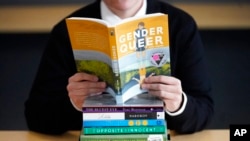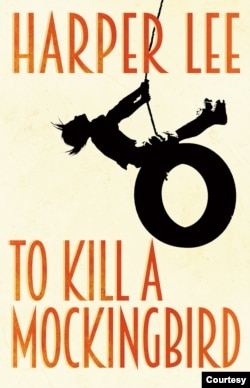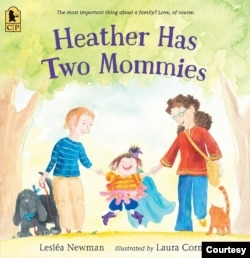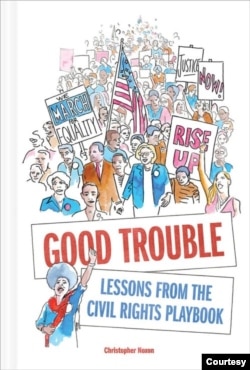Public school districts in multiple U.S. states are grappling with — and, in some cases, acquiescing to — demands by small but vocal groups of parents to rid school libraries of certain books about sexual minorities and racism in America. The desire of some parents to shield students from what they regard as immoral, sexually explicit or racially contentious content is drawing a sharp reaction from defenders of the free flow of ideas and information.
Campaigns to ban books in schools are nothing new. Mark Twain's Adventures of Huckleberry Finn and Harper Lee's To Kill a Mockingbird, both regarded as literary masterpieces despite containing racist language, are among the many books that have been fought over for decades.
But recent months have seen an explosion of battles over what school libraries may and may not offer to students. Dozens of books that deal with sexual orientation, gender identity and racism in America have ended up in the crosshairs of outraged parents.
According to the American Library Association, there has been a dramatic uptick in "book challenges": when an individual or group argues that a book should be removed from library shelves because of its content.
"We're getting multiple challenge reports every day. The volume is just unprecedented," said Deborah Caldwell-Stone, director of the ALA's Office for Intellectual Freedom. The ALA has tracked more than 150 censorship incidents in the past year.
Topping the ALA list for the past few years is Melissa (formerly published as George) by Alex Giro, a story about a transgender girl's quest to affirm her identity.
A 'fight for liberty'
The debates often pit social conservatives demanding book removals against a more liberal-minded contingent that thinks banning books, including those for youngsters, runs counter to America's constitutionally guaranteed liberties.
In fact, both sides claim to be fighting for liberty. The group Moms for Liberty seeks to empower parents to take control over what their children are taught and might otherwise learn about at school.
When it comes to removing books from library shelves, Moms for Liberty co-founder Tiffany Justice noted that some states have obscenity and pornography laws that protect minors from sexually explicit materials.
"The moms don't want pornography in schools," she told VOA.
For instance, Justice denounced what she termed "extremely graphic material" in All Boys Aren't Blue: A Memoir-Manifesto by George M. Johnson, whose book explores growing up as a gay Black male and includes descriptions of sexual relationships. Critically acclaimed and a New York Times bestseller, the book has been removed from school libraries in several U.S. states.
"We're not saying books like this shouldn't be written," Justice said, "but the public-school library isn't the place for them."
Others vociferously oppose taking books off the shelves, calling it censorship of ideas.
"Parents have the right to influence what their children read," said Nora Pelizzari, communications director for the National Coalition Against Censorship. "But it is no parent's right to determine what another kid is allowed to discover in a library."
Stacy Langton begs to disagree.
"Total freedom and permissiveness contradicts your duty as a parent to protect your children," said Langton, a mom who lives outside Washington in Fairfax County, Virginia.
At a local school board meeting, Langton argued that some books were harmful to children and had no place in school libraries. She called for the removal of Maia Kobabe's illustrated book, Gender Queer: A Memoir, from Fairfax County schools. The book, which focuses on the author's search for gender identity, tells a story through drawings, some of which depict sexuality.
Langton, who says her mother is a lesbian, told VOA, "I don't care that this book is depicting gay or whatever. It's pornography and not appropriate for children."
Langton added that exposing youngsters to LGBTQ imagery could be part of a "grooming process" encouraging homosexual behavior.
After being pulled from Fairfax County school libraries, Gender Queer was returned to the shelves after a review committee concluded it was not obscene.
The episode is part of a larger trend of conservative-leaning parents seeking to dictate what's available to a school district's student body, according to the ALA's Caldwell-Stone, who notes that LGBTQ-themed books have drawn controversy for decades.
Heather Has Two Mommies, first published in 1989, was one of the first books to be challenged and banned in some school districts. Written for elementary school students, it depicts a child being raised by a same-sex couple and has no sexual content. But some people denounced the portrayal of a nontraditional family structure as obscene.
Kate Miller, a parent with school-age children in Naperville, Illinois, thinks that school libraries should highlight many different viewpoints, even those some parents may not like.
"Banning books constrains our children's education and development," she said. "It prevents children from learning about themselves and people who are different from them."
Others maintain there is a line that must be drawn.
"Banning books should be used as sparingly as possible," but some are just too graphic, said Carrie Lukas, president of the Independent Women's Forum. She is not against all books with sexual content, she said, but they must be age appropriate.
Emily Phillips Galloway, an assistant professor in the school of education at Vanderbilt University in Nashville, Tennessee, sees a growing disruption of what should be a partnership between parents and teachers on school curriculum.
"A lot of book-banning challenges are about whether teachers are given the support to teach certain topics," she said. "There need to be ongoing conversations with parents and educators on how to teach these complex topics."
Books about racism targeted
The discord extends to past and present race-based issues that have become emotionally and politically charged for many in the Black Lives Matter era.
Author Christopher Noxon told VOA he was flabbergasted when his book Good Trouble: Lessons from the Civil Rights Playbook was pulled from public schools in Virginia Beach, Virginia, for five months. Noxon, who is white, said he "talked to people who had been part of this incredible movement" and then wrote the book from his perspective.
"I think it was targeted as objectionable by conservative groups that did not like the content because it reframes civil rights as a current issue," he said, and not just as something America tackled in the 1950s and '60s.
But what some see as books and curriculum that legitimately underscore present-day discrimination and inequalities in America, others see as destructively divisive.
Elana Fishbein, founder of the group No Left Turn, is concerned about what she calls hateful and racist books and concepts being taught in public schools.
"We object to teaching kids to look at each other first through race," she said.
Pelizzari of the National Coalition Against Censorship said those seeking to ban books constitute a loud minority.
"Most parents don't agree with removing books from the schools simply because you just don't like them," she said.
But Justice of Moms for Liberty has no intention of giving up.
"I will fight to my death to protect the innocence of my own children," she said.







